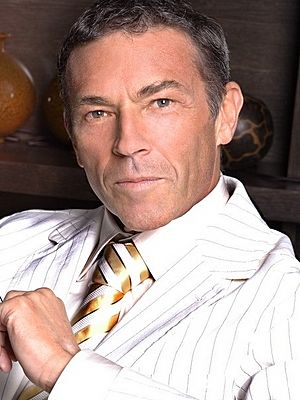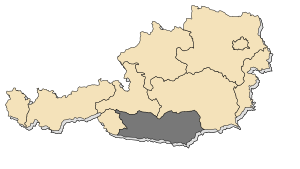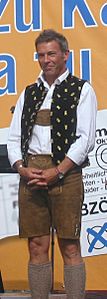Jörg Haider facts for kids
Jörg Haider (born January 26, 1950 – died October 11, 2008) was an important Austrian politician. He served as the Governor of Carinthia twice. He was also the long-time leader of the Freedom Party of Austria (FPÖ). Later, he became the chairman of the Alliance for the Future of Austria (BZÖ), a new party that separated from the FPÖ.
Some countries placed mild diplomatic restrictions on Austria when his party joined the government in 2000. This happened alongside Wolfgang Schüssel's Austrian People's Party. Haider died in a car accident shortly after leading the BZÖ in the 2008 Austrian parliamentary elections.
Quick facts for kids
Jörg Haider
|
|
|---|---|

Haider in 2007
|
|
| Chair of the Alliance for the Future | |
| In office 30 August 2008 – 11 October 2008 |
|
| Preceded by | Peter Westenthaler |
| Succeeded by | Stefan Petzner |
| In office 17 April 2005 – 23 June 2006 |
|
| Preceded by | Party established |
| Succeeded by | Peter Westenthaler |
| Governor of Carinthia | |
| In office 8 April 1999 – 11 October 2008 |
|
| Preceded by | Christoph Zernatto |
| Succeeded by | Gerhard Dörfler |
| In office 21 April 1989 – 21 June 1991 |
|
| Preceded by | Peter Ambrozy |
| Succeeded by | Christoph Zernatto |
| Chair of the Freedom Party | |
| In office 13 September 1986 – 1 May 2000 |
|
| Preceded by | Norbert Steger |
| Succeeded by | Susanne Riess-Passer |
| Personal details | |
| Born | 26 January 1950 Bad Goisern, Upper Austria, Austria |
| Died | 11 October 2008 (aged 58) Köttmannsdorf, Carinthia, Austria |
| Cause of death | Car accident |
| Political party | Alliance for the Future (2005–2008) |
| Other political affiliations |
Freedom Party (1970–2005) |
| Spouse |
Claudia Haider-Hofmann
(m. 1976–2008) |
| Children | 2 |
| Alma mater | University of Vienna (Dr iur) |
| Profession | |
Contents
Early Life and Education
Family Background
Jörg Haider's parents, Robert and Dorothea, were members of the Austrian Nazi Party before it was banned. After World War II, they were investigated as part of a process called "denazification." This process aimed to determine what actions should be taken against former Nazi Party members.
His parents were labeled as "Minderbelastet," meaning they were considered to have had a lesser role in the Nazi structure. Robert Haider worked in a shoe factory. Dorothea Haider, who had been a teacher, was not allowed to teach for a few years after the war.
Growing Up and School
Haider was born in Bad Goisern, Upper Austria, in 1950. He had an older sister named Ursula. He did very well in primary school and high school in Bad Ischl. He was often at the top of his class.
After graduating in 1968, he joined the Austrian Army. He served for more than the required time. In 1969, he moved to Vienna to study Law and Political Science at the University of Vienna. He earned his law degree in 1973.
Marriage and Family
Jörg Haider married Claudia Hoffmann on May 1, 1976. They remained married until his death in 2008. They had two daughters together.
The Bärental Estate
Throughout his political career, Haider focused a lot on the region of Carinthia. His personal life was also strongly connected to this area. In 1983, Haider became wealthy when he inherited a large piece of land in Carinthia called "Bärental" (bear valley).
This estate had a complicated history. It was owned by an Italian Jewish family until 1941. After World War II, the widow of the former Jewish owner asked for money for the property. Even though a group decided the sale was fair, the person who owned it then paid her more money. Later, Wilhelm Webhofer, who was like an uncle to Haider, inherited the estate and then left it to Haider. Today, the land is worth a lot of money.
Political Journey
Rising in the Freedom Party
The Austrian Freedom Party (FPÖ) was started in 1955. It included different political ideas, often against the main parties. In 1970, Haider became the leader of the FPÖ youth movement. He led it until 1974.
Haider quickly moved up in the party. By 1972, at age 22, he was a well-known leader. In 1976, he became the party affairs manager for the FPÖ in Carinthia. In 1979, at 29, he was the youngest member of parliament.
Around 1983, his political approach became more direct. He became the head of the Carinthian FPÖ. He started to criticize the leaders of the FPÖ, which was a smaller party at the time.
A key moment in his career was in 1986. He won the party leadership vote against Norbert Steger. Many party members worried that Steger's liberal views and his alliance with the Social Democrats would harm the party.
Political Challenges in Carinthia
Until 1989, the Social Democratic Party (SPÖ) had a strong majority in Carinthia. In 1989, they lost some seats. The Austrian People's Party (ÖVP) and FPÖ formed a group and chose Haider as the governor of Carinthia.
In 1991, during a debate, a Socialist leader criticized Haider's plan to reduce unemployment payments. Haider replied that the "Third Reich" (Nazi Germany) had a good employment policy. Haider said he meant it as a criticism of the current Austrian government. However, the SPÖ and ÖVP voted against him.
Haider had to resign as governor. The FPÖ–ÖVP group was replaced by an SPÖ–ÖVP group. Even though this comment caused problems for Haider and the FPÖ, a survey showed that many Austrians thought the media's reaction was too strong.
In 1999, Haider was again elected governor of Carinthia. The FPÖ had more than 42% of the votes there. Even when the FPÖ's support dropped nationally in 2002, Haider's support in Carinthia stayed strong. He won again in the 2004 elections with even more votes.
Leading the FPÖ
Haider as an Opposition Leader
Under Haider's leadership, the FPÖ became more right-wing. It reflected Haider's views against immigration and the European Union. Haider often used popular ideas to gain support. From 1986, when Haider became the FPÖ's leader, the party's election results grew. They went from 5% in 1983 to almost 27% in 1999.
Haider largely led the FPÖ by himself. He brought together different right-wing groups in Austria. The party became focused on him as a leader, rather than on specific ideas. His way of leading the party became very strong. However, his supporters did not question his power because he kept winning elections.
The party's mix of popular ideas, anti-establishment views, and nationalist themes gained more support over the years. The FPÖ attracted voters from both the Social Democrats and the Conservatives. Many voters were tired of the long-term government by the "Great Coalition."
Joining the Government with Wolfgang Schüssel
In 2000, Haider's Freedom Party surprisingly came in second in the 1999 elections. After attempts to renew the old government failed, the ÖVP formed a group with the FPÖ. Normally, Haider might have become chancellor. However, he was seen as too controversial to be part of the government. So, Haider stepped aside for ÖVP leader Wolfgang Schüssel.
This new government caused strong reactions in Austria and Europe. Other European Union leaders decided to stop working with the Austrian government. Many felt that a rule against working with far-right parties had been broken. For several months, other leaders avoided contact with the Austrian government.
In February 2000, Haider stepped down as leader of the Freedom Party. Susanne Riess-Passer took over from him. She became Vice-Chancellor when the government agreement was signed. Many people thought this was a way to calm foreign criticism. They believed Haider still controlled the party from behind the scenes.
After looking into the diplomatic restrictions, EU leaders decided the measures were not working. They returned to normal relations in September 2000, even though the government remained the same.
Challenges and the Freedom Party's Decline
In September 2002, after a special party meeting, Susanne Riess-Passer lost the support of many party members. She resigned as Vice Chancellor and Party Chairwoman. Other important figures also resigned.
This led to new general elections in November. The conservative Austrian People's Party (ÖVP) won with 42.3% of the votes. Haider's Freedom Party, which was stronger than the ÖVP in 1999, dropped to just 10.16% of the votes.
Haider stated that he had asked the FPÖ leader to step down so he could lead. When this was refused, he said he would leave national politics for good.
In March 2004, the FPÖ won a majority of votes in the Carinthian parliament elections. On March 31, 2004, Haider was re-elected Governor of Carinthia.
However, outside Carinthia, Haider's popularity seemed to have faded. The FPÖ lost many votes in other regional elections and European elections. They lost more than half of their previous voters in these elections.
Starting a New Party
Because of these losses, the FPÖ, then led by Haider's sister Ursula Haubner, had many internal problems. On April 4, 2005, Haider, Haubner, and other key FPÖ figures announced a new party. It was called the Alliance for the Future of Austria (BZÖ), with Haider as its leader. This effectively split the FPÖ into two parties.
In the following months, the BZÖ tried to become a strong force in Austrian politics, but it had little success. Haider and his new party stayed in the government with the People's Party. This led to strong disagreements between the FPÖ and BZÖ. Later polls showed that both parties were losing voter support. They were in danger of not getting enough votes to be in parliament.
In the 2006 general elections, the BZÖ received 4.1% of votes. This was just enough to get 7 seats in parliament. The FPÖ, now led by Heinz-Christian Strache, did better than expected. They received 11.0% of the votes.
From June 2006 to August 2008, Peter Westenthaler led the BZÖ. On August 30, 2008, shortly before the election, Haider became the party chairman again. After this, the BZÖ received 10.7% of votes, and the FPÖ received 17.5% of votes.
Political Ideas
Since starting his political career in the 1970s, Haider often criticized mainstream Austrian politics. He used simple messages to become popular. He focused on issues where he felt people saw unfairness or the self-interest of big political parties.
In a TV show on September 27, 2008, Haider called the leaders of many world banks a "mafia." He also wanted stronger punishments for banking managers. He suggested creating a special court for financial crimes.
Haider supported fighting against rising prices. He also wanted a minimum salary of €1000 per month. He supported €1000 per month for mothers. He also wanted to change the Austrian social insurance system. Until 2005, Haider supported Turkey joining the European Union. Later, he said that big decisions like the European Union treaty or Turkey's entry should be decided by a public vote.
Immigration Views
Throughout his career, Haider strongly opposed immigration and Islam.
Language Policy
One of Haider's main political battles was against having two languages in southern Carinthia. This area has a native Slovene-speaking community. In the 1980s, Haider wanted to separate Slovene and German-speaking students in elementary schools. In December 2001, the Austrian Constitutional Court ruled that road signs in towns with more than 10% Slovene speakers should be in both German and Slovene.
Haider refused to follow this decision. He even threatened to sue the president of the Constitutional Court. Instead of putting up new bilingual signs, Haider ordered some existing ones to be removed. This caused protests from the local Slovene minority.
In May 2006, Haider personally moved a road sign in Bleiburg. This was in response to the Constitutional Court's decision that the sign was unconstitutional because it was only in German. He was criticized by the local Catholic Church for comparing himself to Jesus Christ. After the Court said his action was illegal, Haider threatened to call a regional public vote. The Federal President Heinz Fischer publicly warned him against this. The public vote was blocked because it was found to be against the constitution. In December 2006, Haider tried to get around the Court's ruling. He attached smaller signs with Slovene place names to German road signs. The Constitutional Court again found this unconstitutional. Haider still ignored the Court's decision.
In his last speech, just hours before his death, Haider repeated his opposition to any visible bilingualism in the region. He warned Slovene politicians "not to play with fire."
Controversial Connections
Haider was known to have visited Iraq to meet Saddam Hussein before the 2003 Iraq War. He also had a friendship with Muammar Gaddafi when Libya was isolated internationally.
Criticism from Arnold Schwarzenegger
In 2000, Austrian-American politician Arnold Schwarzenegger criticized Haider's anti-immigrant comments. Schwarzenegger said: "As an immigrant myself, I am offended by anyone who makes anti-immigrant statements, and it is my opinion that someone who makes statements like Haider's has no place in government. I have never supported him in the past and do not now. I am hopeful that Austria will find a way through this. As an Austrian-born, I am so saddened that, with all the progress we have made working for an open and tolerant society, one man's statements can taint world opinion of an entire country. I know that there are many tolerant people in Austria. It is my hope that their voices can and will be heard."
Allegations of Nazi Sympathies
Haider was often criticized for statements that seemed to praise Nazi policies or were considered antisemitic. International reports often mentioned his comment that the Nazi government had a "proper employment policy." He had to resign as governor of Carinthia in 1991 because of this. Haider apologized years later. During one debate, Haider described World War II concentration camps as "punishment camps."
On several occasions, Haider made comments about Austrian World War II veterans. These comments were seen by some as supporting the war and the Nazi SS. Speaking to veterans in 1990, he said they were "decent people of good character" and "remain true to their convictions." Haider stated he was not specifically talking about Waffen-SS veterans. On another occasion, he said, "the Waffen-SS was part of the Wehrmacht (German military) and because of that it deserves every honour and recognition." The Waffen-SS was not actually part of the Wehrmacht.
In 2000, at a gathering of veterans, including Waffen-SS veterans, he said, "Those who come to Ulrichsberg are not the old Nazis. They are not neo-Nazis, they are not criminals."
Haider also compared the deportation of Jews by the Nazis to the expulsion of Germans from Czechoslovakia after World War II. His critics pointed to a comment he made about the leader of the Jewish community of Vienna, Ariel Muzicant. Haider suggested he did not understand how someone named Ariel (also a laundry detergent brand) could have gathered so much "filth." Critics said this remark was antisemitic.
He claimed that Muzicant faked antisemitic hate letters to himself. He later took back these accusations and apologized for his "derogatory remarks."
Haider was closely watched by Mossad, the Israeli secret service. Peter Sichrovsky, a Jewish-Austrian politician and former aide to Haider, gathered information on Haider's controversial contacts with Arab leaders.
Because of Haider's perceived contacts with people who deny the Holocaust, the Israeli Foreign Ministry said in September 2008 that it was very concerned about the Austrian elections. A spokesman said Israeli officials were "very worried about the rise to power of people who promote hatred, Holocaust denial, and befriend Neo-Nazis. We see it as a disturbing development and are following the matter very closely."
Death and Its Effects
Haider died from injuries in a car crash in Köttmannsdorf, near Klagenfurt, Carinthia. This happened in the early hours of October 11, 2008. He was on his way to celebrate his mother's 90th birthday.
Police reported that Haider's car went off the road, rolled down a slope, and flipped over. This caused him "severe head and chest injuries."
At the time of the crash, Haider's car was going at least 142 km/h (88 mph). This was more than double the speed limit of 70 km/h (43 mph) for that road. An initial investigation found no signs of foul play. Police strongly rejected theories that his death was planned.
Austrian President Heinz Fischer called Haider's death a "human tragedy." Reactions in the press were mixed. Wolfgang Fellner, a newspaper publisher, wrote that he had "fought bitterly" with Haider. But he added that Haider "finally, became a gentle, considerate, almost wise politician... Alas, he was once again too fast." Fellner concluded that Haider "died as he lived: always full throttle, always over the limit."
However, Ernst Trost wrote in another newspaper that while Haider had a "comet-like rise" in politics, he also "ever again embarked on self-destructive actions and provoked opposition." The Chief Editor of Kurier, Christoph Kotanko, wrote that "however much his brown tones, xenophobia and aggressive populism were to be rejected... Haider's criticism of the dominant conditions of the 1980s and 90s was partly also justified." He added that Haider had "named, fought and in part also changed" those conditions.
On January 25, 2009, a motorway bridge in Carinthia was renamed "Jörg-Haider-Brücke."
That year, the effects of Haider's financial policies became clear. The Hypo Alpe-Adria-Bank International faced serious problems. This later led to the bank being taken over by the government. A Swiss newspaper wrote about "Haider's money destruction machine." Carinthia now has the highest debt per person in Austria.
See also
In Spanish: Jörg Haider para niños
 | John T. Biggers |
 | Thomas Blackshear |
 | Mark Bradford |
 | Beverly Buchanan |



